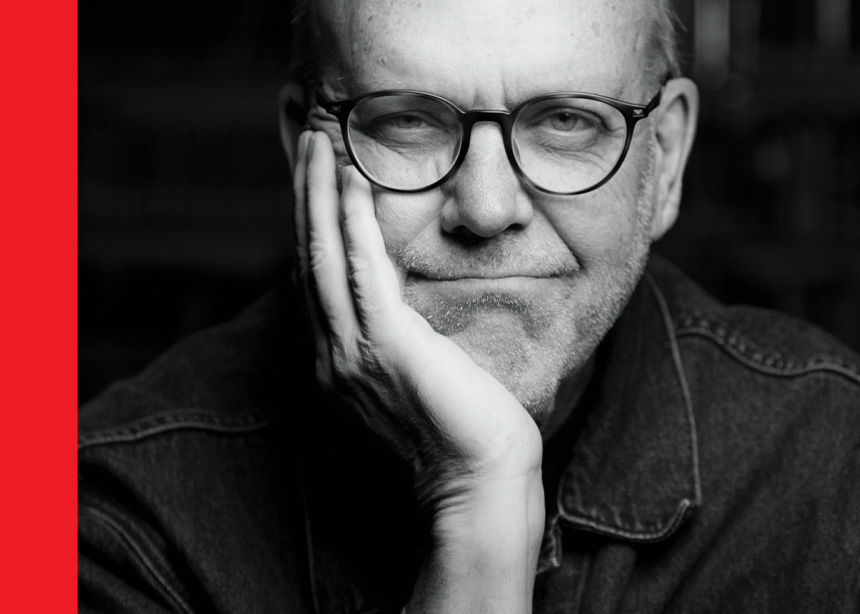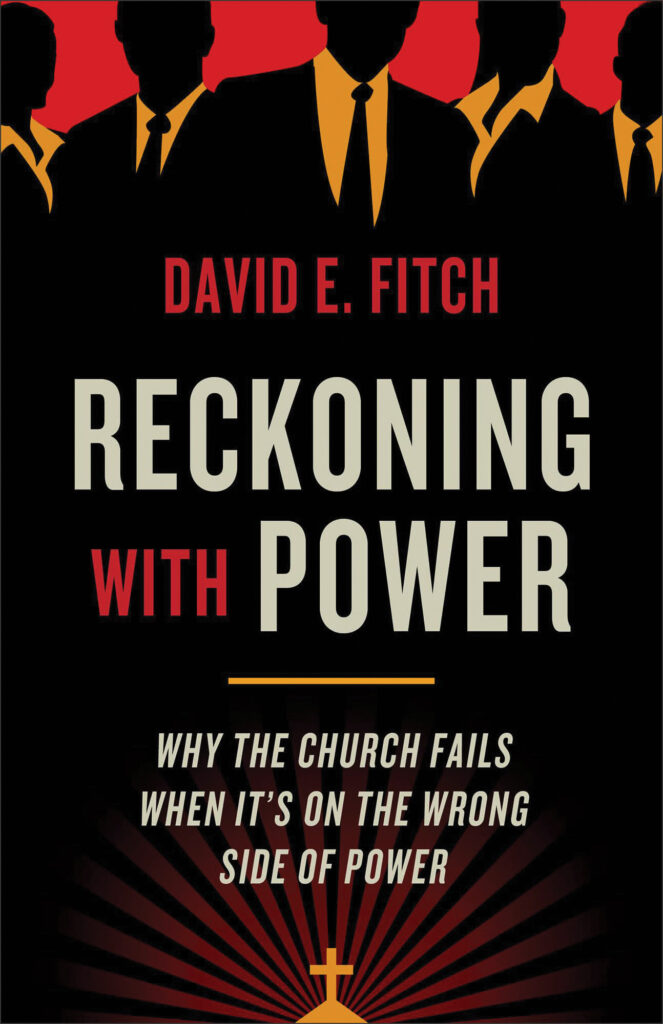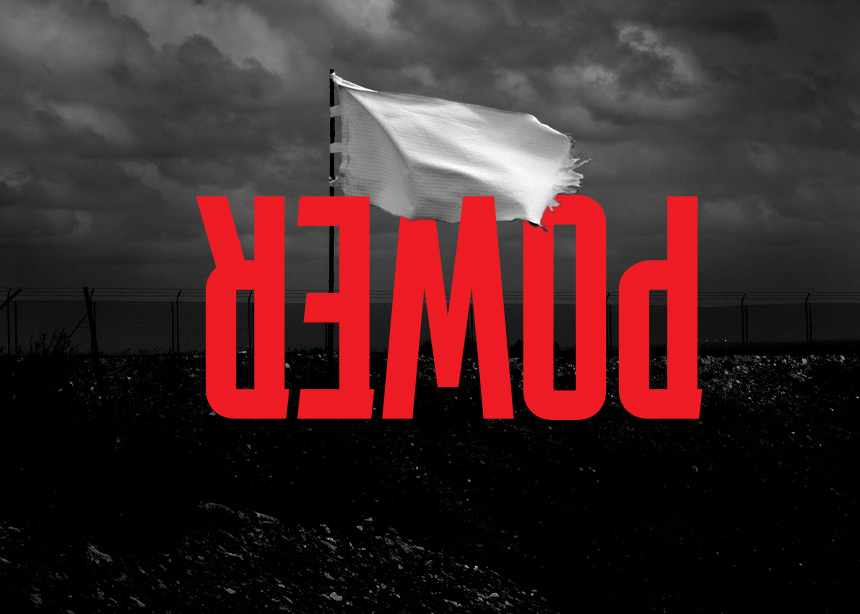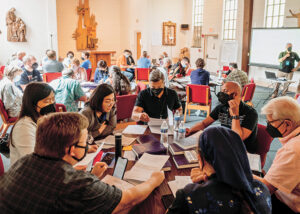When David Fitch speaks about church and power, his starting point is not any big thoughts from the seminary classrooms he’s so familiar with or even his experience as pastor of a majority-Black church. It’s the “cesspool” of the Chicago financial sector, where he spent 10 years as a dangerously successful broker and financial manager.
He begins with his own stark experience of how the power of money and influence grabbed hold of his soul and how the power of God saved him from that grasp.
On the day in 2000 when he walked across the Chicago River to the train and said goodbye to that world, he had been offered $350,000 a year plus an ownership stake in a financial firm. Instead, he went to plant a church, for which he was paid $36,000.
“I’m just a sinner saved by grace,” Fitch says at numerous points throughout an hour-long interview prior to his final keynote address at the Canadian Mennonite University Renew Conference for pastors and leaders in February in Winnipeg.
“I’m just a sinner saved by grace.” He says it like someone who will never, ever forget the person who saved his life from sure ruin.
The other repeated refrain, and this is paraphrased, is you have no idea how messed up, insidious and soul-corrupting power is unless you’ve experienced it, as he did during his perilous sojourn in the world of money.
Out of his experience of worldly power and God’s saving power—and from his observation of so many churches being eaten up by abuse scandals of various kinds—Fitch’s message for Christians is threefold: 1) distinguish very clearly between worldly power (“power over”) and godly power (“under power,” as in, under God); 2) resist the temptation to blur the two; and 3) rely on God rather human or worldly means to achieve godly ends (though he carves out a bit of room for worldly power).
Godly power, according to Fitch, is relational, working in and among people. It is never coercive. It does not take control. It works by the Holy Spirit. It convicts but does not override a person’s agency. It works in individual souls and among social realities.

Neo-Anabaptist
Fitch, a professor at Northern Seminary in Chicago, has authored and co-authored several books, including The Church of Us vs. Them and, most recently, Reckoning with Power: Why the Church Fails When it’s on the Wrong Side of Power.
He has been involved in eight church plants over 30 years and currently pastors at a Christian and Missionary Alliance church in the Chicago area.
Having come out of “evangelical fundamentalism,” he is a fervent neo-Anabaptist, one of more than a few fairly prominent, socially attuned American evangelicals who have found in Anabaptism a vital and truly distinct alternative to other expressions of Christianity in the U.S. but who are not part of a Mennonite church.
The writing of Stanley Hauerwas was part of what drew Fitch to Anabaptism.
“Ya don’t know what ya got,” he says to those of us in a position to take Anabaptism for granted.
Christ and coercion
Part of what Anabaptists have is a tradition of opting out (though our record is terribly spotty) of coercive, worldly power. This brings us back to Reckoning with Power (see excerpt on page 15), the Winnipeg conference and a critical choice between the two kinds of power.
Referring to his experience of worldly power while working in money in his twenties and thirties, Fitch says, “I can’t explain to you how [messed] up that world was—what it did to my soul, how I looked at women. I tried every which way to get out of it, and I wish the Lord had done something faster.”
Though he resisted, he was getting sucked in. “[I] and a fellow trading partner would leave for a coffee break and say, ‘that’s a cesspool in there,’ and then we’d go right back into the cesspool.”
Fitch does not distinguish between the power he tasted and the power that so often infects churches and leads to abuse of various kinds—the “dumpster fires” he writes about. He says the way to stop that power from hurting people and destroying churches is not primarily with guardrails or limits but through surrender to an entirely different form of power—the form that got him out of the mire.
Without that fundamental switch, guardrails will inevitably fail, and people will get hurt, he says.

To wield or surrender
While various Christian thinkers favour using worldly means for godly ends, and distributing our worldly power to others, in Reckoning with Power, Fitch says, such arguments fail to distinguish worldly power from godly power.
One of the tempting uses of power, Fitch writes, is to leverage our privilege to bring about justice, an approach that “narrates persuasively how we can use this power subversively (against the system) toward the undoing of racism and other forms of injustice, to reshape culture. In other words, let us use ‘power over’ to undermine the negative effects of ‘power over.’”
Questioning the usual thinking, Fitch talks about an approach that subverts privilege itself rather than wielding it.
“We can show the world another way; we can,” he says, “but it has to start with Jesus. It can’t start by ‘I’m gonna use my privilege which I obtained in the world because of nothing I did but because I’m a white guy, and I’m gonna use it to give other people the same privilege.’ The privilege is polluted and chances are, one of these days, because I’m a white guy and can’t see my privilege, or I see it and camouflage it, that I’ll end up perpetuating more of the same ills on other people. It’s just the way it works.” (For more on privilege, see sidebar on page 15.)
He leaves some room for using privilege to “lift up the oppressed,” but he emphasizes caution. “If that becomes … the be-all and end-all… nothing in the structure ever changes. The privilege keeps on going.” Systems need to change, “and the church is the place where that system can change; we can show the world another way.”
Social justice via ‘under power’
When asked about examples of social justice initiatives that shifted to using godly power, Fitch says they are rare but tells of a suburban church in Toronto that would go to an inner city neighbourhood on Sunday afternoons, set up tables and serve food to the poor across the table. As relationships developed, inner city people said they loved the initiative but also had food to contribute and wanted to help serve.
They started eating together and, over time, “a church broke out” and a number of people from the suburbs moved to the area.
A place for worldly power
Fitch does not categorically reject worldly power. Traffic lights, which rely on worldly laws and worldly enforcement, prevent accidents. That’s good. Worldly power, he says, can “preserve” lives.
A police officer can preserve the life a woman threatened by a violent partner—and that is unreservedly good—but neither officers nor laws can bring healing, redemption and sanctification, as Fitch puts it.
Fitch is not calling Christians to reject every form of worldly power, but to see its limits, use it with great care, and make way for the power that can do “immeasurably more than all we ask or imagine, according to his power that is at work within us” (Ephesians 3:20).
Mutual submission
Many discussions about power and church focus on who has too much power, who should relinquish it, how dangerous it is in certain hands, which groups are deserving of it and which are not. But those discussions remain in the realm of navigating and negotiating worldly power, a power that tries to get its way. Fitch points us to godly power.
He says, “It’s time to get white men out of [the] use of ‘power over.’” This in no way precludes a role for them in making space for the Spirit to work. In this context, Fitch says, “I [as a white man] just want to be present to people,” referring to a primary way to create space for God to work. For him, church outreach is about “the practice of presence in people’s lives, discerning what the Spirit is doing.”
In terms of how churches and faith organizations—which usually have worldly power differentials embedded in their hierarchical structures—operate, Fitch advocates for “mutual submission,” recognizing that submission is a “much-despised” word. This applies only in contexts where there is a shared belief that God’s power truly is at work in the context. Parties must be equally submitted to each other, and it must start with those in positions of greatest authority.
This is, in part, about avoiding the abuse that has so harmed people and the church. Fitch says this is never about people putting themselves in harm’s way or remaining in abusive situations.
Mutual submission could take the form of someone offering an idea to a group and, instead of maneuvering to ensure they get their way, stating that they submit the idea and themselves to the discernment of the Spirit.
Overt, stated submission can break the hold of worldly power in a situation, Fitch says, though it is not a formula that works every time. It’s up to God. Taking the posture of coming under God’s power can entirely change the dynamic of a situation deadlocked in a power struggle.
Practical examples
In Reckoning with Power, Fitch gives the example of a congregant who planned to start a new ministry and wanted Fitch to use his position to push the initiative. Fitch refused, saying that the church’s support for the ministry would have to depend on collective discernment of the Spirit and signs of whether the ministry would bear godly fruit. Support could not hinge on his power play.
He also gives the example of an ordinance that limited the number of cars that could be parked on a residential driveway in his neighbourhood. This targeted Hispanic residents who often had multiple families living in a single home and thus more vehicles. When he was going to use his position to leverage a meeting with the police, a fellow pastor said to him: “Dave, you’re doing it again. Your privilege is showing.”
He was headed toward a scenario in which less advantaged people would keep going to him to solve problems via power. Change may well happen, but it would be centred around his privilege.
Instead, Fitch and his colleagues encouraged their Hispanic sisters and brothers to arrange a meeting with police, in a place of their choosing and with them leading the conversation. This approach could lead to actual understanding, rapport and shared responsibility.
The white people would step back and pray.
Ultimately, people need to step aside and make space for the work of the Spirit, which saves, heals, redeems and sanctifies. Fitch says Christians, and especially leaders, need to “shut up, listen, submit, be present, allow God to work in our midst…. I’ve seen it again and again.”
How does Fitch, a professor, pastor, author, speaker and person of privilege and influence, avoid the allure of worldly power? The answer comes quick: “I’m just a sinner saved by grace. Anything that happens here is by the pure grace of God.”
He talks about how his mother, at any hint of Fitch speaking about accomplishments, will remind him: “Give all glory to God; this is not you, it’s Jesus.”
Discerning sexuality
Matters of sexuality and gender are, of course, a primary place that power plays out in churches. Fitch, who teaches sexual ethics, among other things, laments a narrow focus on policy statements for or against LGBTQ affirmation, which, to him, are “two different sides of the same coin”—the “power over” coin.
He wants churches to offer guidance on sexuality more broadly rather than a laser focus on affirming or not affirming. He has seen how sexuality can mess up lives, and says, “How can [the church] abdicate responsibility for discipleship in this important area of life?”
He encourages churches to look closely at constructs of attraction, “what Christian marriage is and is not,” and why one might choose monogamy or to limit sexual activity.
In Reckoning with Power, Fitch writes that discerning sexuality could “be a powerful practice of godly power manifesting God’s healing presence among hurting and marginalized persons.”
He writes about, “leaving space for God to work in the lives of his people, no matter what sexuality they identify with.” He calls for less of us insisting and more of God working.
“We need churches with the courage to hold the spaces open, resisting the move to ideological foreclosure of the space by not-affirming/affirming policy statements,” he writes.
“All we need is just a little space and Jesus can break through this mess,” he says, “but right now it’s wound pretty tight.”
Belief in power
The whole premise of godly power raises a stark question of faith. Is the challenge to distinguish between two different kinds of power also a fundamental challenge to simply believe—believe that God exists and has power?
“There is a bit of that, absolutely,” Fitch replies. “Not just a bit.”
We will not surrender our influence and come under God’s power unless we truly believe God has power.
Fitch talks about the pervasive, continual attempts to diminish and marginalize belief in the secular West.
But, he testifies, “There is another power, and it is power and a force on completely different terms—the power of God at work in the world, not through violence. This is the central core of the Gospel, and I learned it from the Anabaptists.
“And the question is: do you know it?” he says with a laugh, referring to Mennonites. “You need an evangelical to tell ya…. You got something here—wake up.”








Leave a Reply
You must be logged in to post a comment.